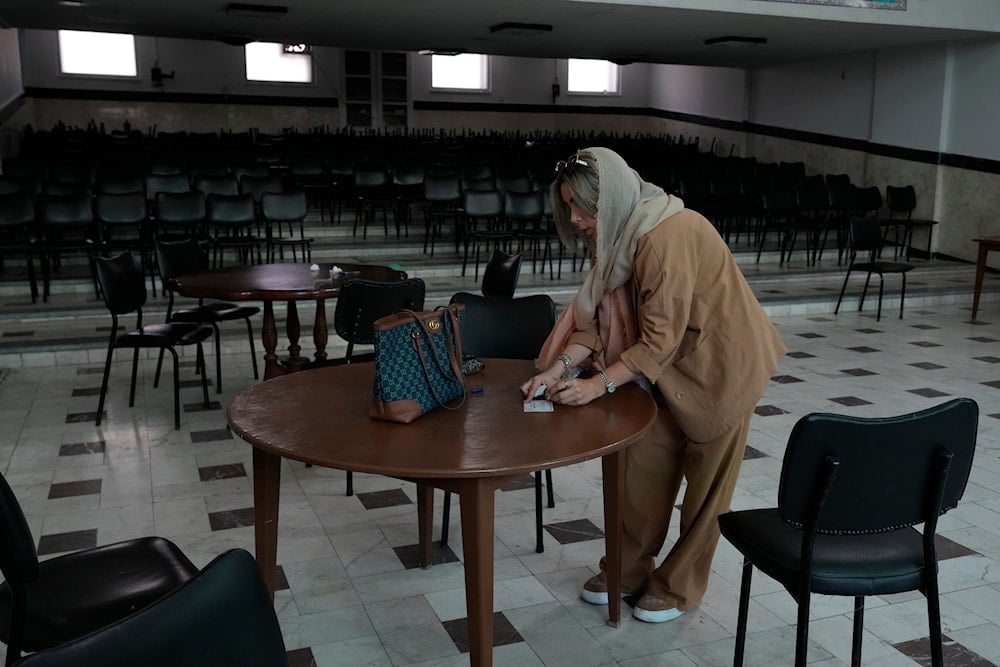Iranians voting to decide presidential race between Jalili, Pezeshkian
Al Mayadeen's correspondent in Tehran points out that "the turnout rate so far is higher than the turnout rate in the first round of the presidential elections."
-

An Iranian woman fills out her ballot for the presidential runoff election at a polling station in Tehran, Iran, on July 5, 2024. (AP)
Since the early hours of the morning, Iranians have been actively participating in the second round of the presidential elections to choose their new president. The race is between candidates Saeed Jalili and Masoud Pezeshkian.
The voting commenced at 8:00 am local time, both within Iran and abroad, and is scheduled to last for 10 hours, with the possibility of an extension.
More than 60 million voters were called upon to participate in the election to choose the 14th president of the Islamic Republic of Iran, with opinion polls indicating a tight race between candidates Jalili and Pezeshkian.
Jalili cast his vote at the Jameh Mosque in the Qarchak district, southeast of Tehran, accompanied by his campaign manager, Mohsen Mansouri. Meanwhile, Pezeshkian voted at Ashurai School in the Qaleh Hassan area on the outskirts of the capital, accompanied by former Foreign Minister Mohammad Javad Zarif.
For his part, Al Mayadeen's correspondent in the capital, Tehran, indicated that the turnout of Iranian citizens is increasing, adding that "the turnout rate so far is higher than the turnout rate in the first round of the presidential elections."
Our correspondent stated that "more than 10 million Iranian voters have cast their votes so far," adding that "the high turnout indicates that the turnout in the second round will be greater than the turnout in the first round."
20% increase in voters
Tehran Governor Alireza Fakhri told Iranian media, “We saw Iranians rushing to the polling stations since the early hours of the morning, and accordingly this attendance showed a 20% increase compared to the first round, which indicates the new movement and political will of the people.”
He added, "In order to protect the largest possible number of votes of the Iranian people, there are 7,010 people in the branches representing the candidates to prove with sufficient supervision that the elections are completely fair."
In the early morning, Iranian Leader Sayyed Ali Khamenei cast his vote in the capital, Tehran.
Sayyed Khamenei emphasized the importance of the Iranian people exercising their "will and determination" to conclude the electoral process and elect a new president for the republic, adding that there is greater incentive than ever for people to participate in the elections.
'Every vote is worth a missile'
For his part, after casting his vote, Brigadier General Amir Ali Hajizadeh, the commander of the IRGC's Aerospace Force, emphasized that voting is not only a national duty but also a religious obligation that should be fulfilled promptly.
Hajizadeh expressed hope that the Iranian people would fulfill their duty in the elections, highlighting that "every vote in the ballot box strengthens our strength, power, and identity in the region."
He also hoped that the Iranian people would "participate in the elections to elect a good president for the next four years." Hajizadeh pointed out that "participation in the elections is very necessary, and every vote is equal to a missile."
Hadi Khamenei: Elections are important at this critical time
Sayyed Hadi Khamenei, the Iranian Leader's brother, called on the Iranian people to participate in the elections, emphasizing their importance.
Sayyed Khamenei emphasized that "this election cycle is highly significant given the current social and global conditions, the challenges in the region, and the hostile plans devised by Iran's adversaries and neighboring countries." He added that "important regional issues, such as the aggression against Gaza and Lebanon, are being addressed, and in light of these critical matters, we require leaders who are skilled in management and possess sound judgment."
He explained that "electing the most suitable candidate means electing a knowledgeable, active, and compassionate person with a history, who chooses a suitable team," and extended his "peace to the Resistance fighters in Lebanon, especially Hezbollah."
In the first round, Pezeshkian secured 10,415,991 votes, while Jalili received 9,473,298 votes.
Under Iran's presidential election law, a second round is mandated if no candidate achieves an absolute majority (50%+1) in the first round. This second round includes only the top two candidates with the highest number of votes.

 4 Min Read
4 Min Read








